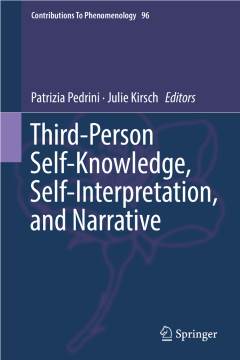Repository | Series | Book

Third-person self-knowledge, self-interpretation, and narrative
Edited by
Patrizia Pedrini, Julie Kirsch
In recent years, the idea that each person is in a privileged position to acquire knowledge about her own mental states has come under attack. A growing body of empirical research has cast doubt upon the existence of what philosophers call "first person self-knowledge', i.e., knowledge about our mental states that is often thought to be immediate, transparent, and authoritative. This line of thought has led some philosophers to claim that what seems to be "first-person self-knowledge' is really just"third-person self-knowledge,' i.e., knowledge about our mental states that is inferential, opaque, and fallible. This book discusses challenges for first-person knowledge and explores the true nature of third-person knowledge.
Publication details
DOI: 10.1007/978-3-319-98646-3
Full citation:
Pedrini, P. , Kirsch, J. (eds) (2018). Third-person self-knowledge, self-interpretation, and narrative, Springer, Dordrecht.
Table of Contents



